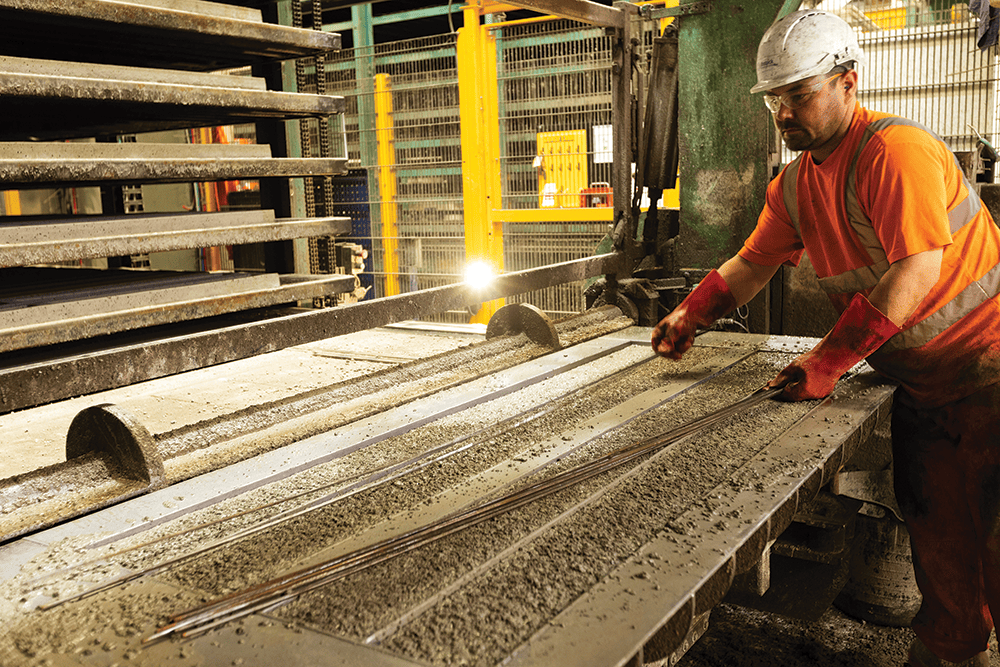Market need & context
Making lower carbon concrete and using less cement is a major part of our commitment to dematerialisation. The production of Portland cement alone is responsible for some 8% of global carbon emissions*. Reducing reliance on traditional cement is therefore essential – whether to help clients meet their own carbon reduction targets, or to prepare for future legislation.
Embodied carbon is not currently part of building regulations, but there is industrywide expectation that legislation will happen sooner rather than later. When it does, that will drive further change across the concrete industry.
Project objective: reduce cement content in our manufacturing process
Project overview Within Ibstock’s 14 concrete batching factories, hundreds of hours of research and development have been spent exploring new processes and concrete specifications. Not only is this resulting in products with lower embodied carbon, but it is also making more efficient use of materials. The wide-ranging work features the following elements:
Using lower carbon cement or cement replacements as part of concrete products.
Replacing steel reinforcement with a basalt alternative.
Shifting to off-site manufacture of products.
Project highlights
Using less cement means engaging with suppliers to look at blended cements or replacement cements. The following highlights offer a snapshot of some of the projects Ibstock has undertaken to deliver on its dematerialisation ambitions.
SustainaCem
SustainaCem is a cement developed in partnership between Ibstock and LaFarge Cement. One-fifth of its content is ground limestone, which is much less energy intensive to produce than the clinker it replaces. Our Technical Team has been able to utilise SustainaCem to produce concrete products in which the strength and the durability of our products are maintained and enhanced.
Earth friendly concrete (EFC)
Ibstock has formed a partnership with Earth Friendly Concrete (EFC). Thanks to using a binder made from industrial waste products, rather than Portland cement, EFC has around 70% less embodied carbon than traditional concrete.
Many low carbon cement replacements have been developed for low-grade concrete use, where extended curing times and lower strengths are acceptable. The really exciting thing about working with EFC UK is that we’ve been able to make fast cure, high strength, durable concrete, which opens up so many possibilities for our concrete products.
Changing the composition of products to feature SustainaCem or EFC does not impact on how concrete products can be processed at the end of their life.
Shifting to basalt reinforcement
Another area of research has focussed on alternatives to steel reinforcement in concrete products. Because basalt is inert, shifting to basalt reinforcement has the potential to reduce the cover to concrete required and so maintain product durability while ensuring no loss of performance.
Network rail collaboration
As a sole supplier of concrete cable troughs to Network Rail we have been working together to significantly reduce both the weight and embodied CO² of the product. The troughs run alongside the railway and carry cabling, while their lids also serve as paths for maintenance workers. Combining low carbon concrete with a redesigned unit has led to a reduction in weight of the troughs from 38kg to 25kg. They use less material, are easier to install, and are equally as capable of withstanding the substantial stresses that the units are exposed to throughout our railway network.
Lessons learnt & next steps:
Work collaboratively for the best outcomes. To use less cement in our process means engaging with suppliers to look at blended cements or replacement cements.
Invest for the future. Making lower carbon concrete requires investment to update well-established manufacturing facilities to accommodate new technology. For that reason, Ibstock has commissioned a number of new concrete batching plants and upgrades.
Create the right conditions. At Ibstock, every product starts in a batching plant, so by developing our concrete technology through in-house capability and wider collaboration, it gives us the ability to do exciting things across the business and industry.
Don’t fear challenges. Decarbonisation in precast has been a big challenge for our concrete division whilst maintaining the same quality, speed of cure and product durability. However, it is a concrete technology challenge we are up for and has helped to significantly reduce waste and material use. There is a demonstrable saving between traditional on-site shuttering and casting concrete on site, versus casting products in our factories using our latest technological advances.

